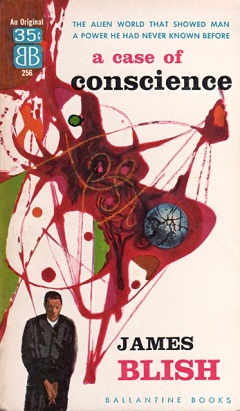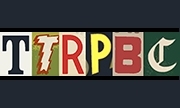Novel Review - A Case of Conscience by James Blish
A Case of Conscience
by James Blish, 1958, 192pp

Synopsis
This 1959 Hugo winner is about a Jesuit priest, Father Ramon Ruiz-Sanchez, who travels to a newly discovered planet (Lithium) located 50 light years from earth. He's part of a team sent to investigate whether the planet would be suitable to open up to human contact. There's life on the planet, and one intelligent species (unsurprisingly called "Lithians").
The first part of the book follows the four team members as their stay draws to a close and they meet up to discuss what their personal recommendations will be to the government at home. One team member claims the planet could be exploited for its lithium to make bombs. Another believes there's both great biological and sociological potential here, and that contact would benefit human kind for what it could learn. The third member has formed no opinion and is neutral.
The fourth team member, Father Ruiz-Sanchez, though, advocates for a total quarantine. He has studied the natives the most closely, and although he likes them as individuals, is concerned by the fact they have evolved an ethical system that perfectly mirrors that of Catholics, and they've done so without having a belief in god or any kind of religion. He fears the planet, therefore, is a trap placed here by Satan, and one to be avoided. He presents all this very rationally, and although it sounds far-fetched in my description, Ruiz-Sanchez is no bible-thumping evangelist. He's a catholic scientist in the vein of real life Vatican astronomer, Guy Consolmagno.
Just before Sanchez and team depart for earth, the local Lithian whom Ruiz-Sanchez has befriended arrives to give him a gift: an elaborately decorated urn what contains one of his offspring. He intends this offspring to be raised on earth and extracts a promise from Sanchez to care for it. The proverbial apple given to Adam? The Lithians are reptiles, by the way, and don't raise their young - they basically raise themselves, and are born with all their intelligence and morals already in place. Only their body changes as it matures, and they learn to adapt to their planet. The Lithians are often referred to as 'snakes' in earth slang.
Back on planet earth, Ruiz-Sanchez spends the middle third of the book trying to justify his position. He is going to be excommunicated for heresy. Meanwhile, the Lithian pup continues to mature.
In the final third, things come to a head. The nuclear bombs scientist from part one gets his way and returns to Lithium to pave the way for mineral exploitation. On Earth, the young Lithian matures into a devilish teenager. And the Pope and Ruiz-Sanchez finally meet, and Ruiz-Sanchez learns the error of his ways. Fortunately, the Pope doesn't disagree with his assessment, so much as his methods, and gives Sanchez the means to provide a final solution to the problem of Lithium.I'm being vague to avoid spoiling the finale.
Analysis
There's a fair amount to think about in this novel. I think it would make a great movie, actually, though there are things I would change through the middle of the book. I rather like how the book ends - right at the climax, with no deconstruction or denouement at the end. It ends with a powerful scene, then stops, leaving the reader to dwell upon the implications.
The writing is competent, but not thrilling. There were some odd turns of phrase and description that stuck out as odd to me ("... the insidious slope of the hill..."). Some aspects of the book were not terribly convincing, such as why Sanchez concluded that Lithian ethics are the same as Catholic ethics. Neither was the behaviour of Lithian Junior convincing to me. But overall these are minor points. The book was held together by its Big Idea, and that was good enough for me.
By the way, though I didn't see this mentioned anywhere as I was reading up about this book, I felt the name of the planet was a clear reference to the biblical (and pre-biblical) character of Lilith, who according to myth is Adam's first wife, created from the same earth. She rejects Adam (who does not see her as equal) and flees, and Adam complains to God.
"Said the Holy One to Adam, "If she agrees to come back, what is made is good. If not, she must permit one hundred of her children to die every day." The angels left God and pursued Lilith, whom they overtook in the midst of the sea, in the mighty waters wherein the Egyptians were destined to drown. They told her God's word, but she did not wish to return. The angels said, "We shall drown you in the sea." (wikipedia)
Lithian children are born in the sea, and must move to land to mature. Many die in the process.
"Leave me!' she said. "I was created only to cause sickness to infants. If the infant is male, I have dominion over him for eight days after his birth, and if female, for twenty days."
When the angels heard Lilith's words, they insisted she go back. But she swore to them by the name of the living and eternal God: "Whenever I see you or your names or your forms in an amulet, I will have no power over that infant." She also agreed to have one hundred of her children die every day. Accordingly, every day one hundred demons perish, and for the same reason, we write the angels' names on the amulets of young children. When Lilith sees their names, she remembers her oath, and the child recovers.
And so, here we have a planet like earth, created from the same soil, where children drown in the sea, named similarly to a mother of demons. Interesting stuff, no?
This was a 3-star novel for me. I liked it, appreciated its good qualities, but wasn't bowled over. Recommended to SF fans who like a bit of allegory. It may take things a stretch too far for Catholics, though. To paraphrase Guy Consolmagno; "Jesuit? That's not a Jesuit! This is a Jesuit!"

 Help offset server costs by donating. This is totally optional. Any overages will go to library fines or new books.
Help offset server costs by donating. This is totally optional. Any overages will go to library fines or new books.

Comments
Cities in Flight... with Rock and Roll!